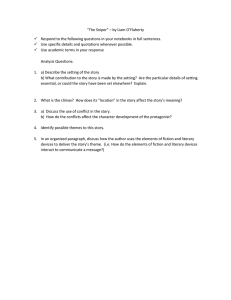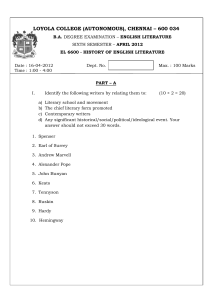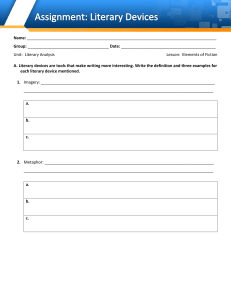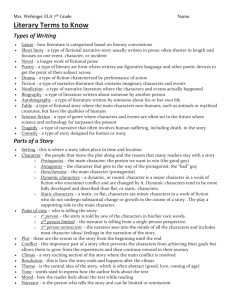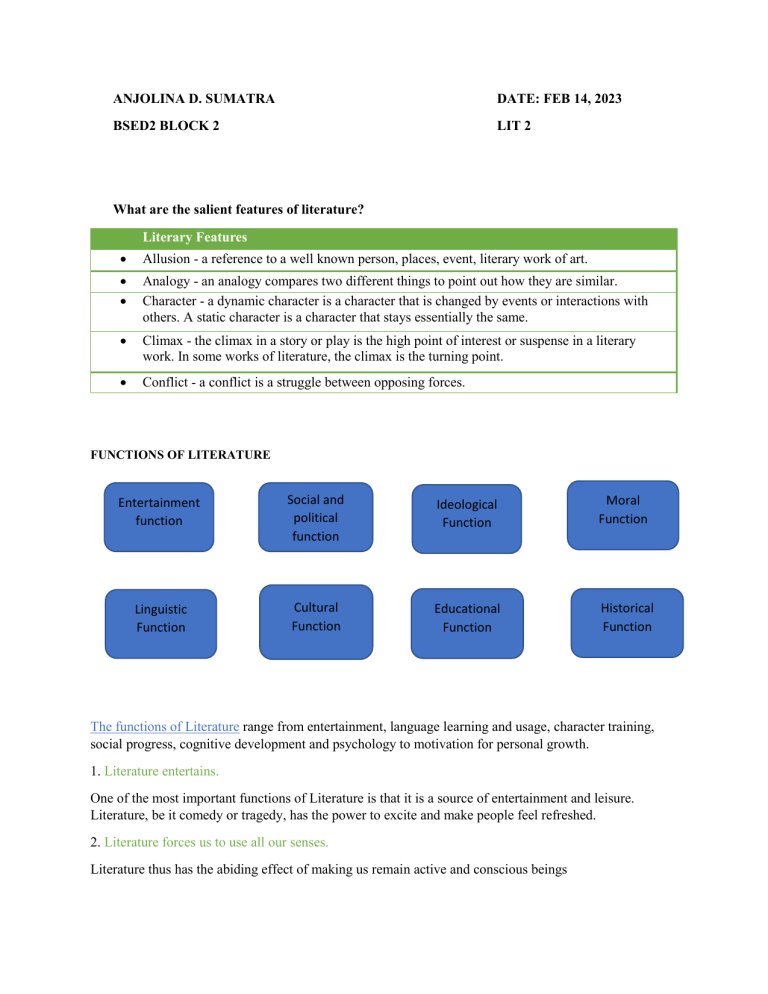
ANJOLINA D. SUMATRA DATE: FEB 14, 2023 BSED2 BLOCK 2 LIT 2 What are the salient features of literature? Literary Features Allusion - a reference to a well known person, places, event, literary work of art. Analogy - an analogy compares two different things to point out how they are similar. Character - a dynamic character is a character that is changed by events or interactions with others. A static character is a character that stays essentially the same. Climax - the climax in a story or play is the high point of interest or suspense in a literary work. In some works of literature, the climax is the turning point. Conflict - a conflict is a struggle between opposing forces. FUNCTIONS OF LITERATURE Entertainment function Social and political function Ideological Function Moral Function Linguistic Function Cultural Function Educational Function Historical Function The functions of Literature range from entertainment, language learning and usage, character training, social progress, cognitive development and psychology to motivation for personal growth. 1. Literature entertains. One of the most important functions of Literature is that it is a source of entertainment and leisure. Literature, be it comedy or tragedy, has the power to excite and make people feel refreshed. 2. Literature forces us to use all our senses. Literature thus has the abiding effect of making us remain active and conscious beings 3. Literature teaches us valuable lessons about human nature. Another function of Literature is that it instils in us a spirit of tolerance and understanding. Literature enables us to live harmoniously with one another. 4. Literature has a moral effect on society. Satirical and didactic literary works, for example, are known to have played a positive role in changing the behaviour of individuals and the way societies are organized. In fact, literature is a powerful tool for effecting behavioural and social change. 5. Literature improves and enriches our use of language. This is borne out of the fact that the main medium of literary expression is language. The home of idioms, figures of speech and other stylistic expressions is Literature. 6. Literature inspires. Stories, movies, plays, speeches, and poems have since time immemorial inspired people to do great things. What are the values of the world literature? A work of literature can be valuable in several ways. Open your mind: Literature has . . . if reading it . . . entertainment value is an enjoyable way to pass the time. political value can change the way people live with and influence each other. artistic value helps us contemplate the nature of beauty and human creativity. cultural value sheds light on the place and time of the author of the work. historical value helps one understand the past and how the world has evolved. philosophical value explores human knowledge, how we know and what we know. moral value teaches a lesson that will inspire the reader to live a better life. ethical value helps us asks questions related to the standards of a "good" life. • Prose is writing that resembles everyday speech. The word prose is derived from the Latin prosa which literally means straightforward. Prose is adopted for the discussion of facts and topical reading and does not adhere to any particular formal structures other than simple grammar. • DIVISION OF LITERATURE Poetry is any writing in verse form. The word poetry is derived from the Greek poiesis which literally means creating or creating. Poetry relies heavily on imagery, precise word choice and figures and speech. other than simple grammar. WHAT ARE THE TYPES OF LITERATURE? Realistic fiction: A story with characters, places, and events that could occur in everyday life but not based on actual occurrences. Nonfiction prose is factual writing written in non-metrical language. Drama combines elements of prose and poetry into plays that are usually intended to be performed on stage. Novels– a novel is generally long and narrative. It tells a story with characters, a plot, and a setting. Prose can be found in books, magazines, newspapers, online articles, blogs, etc. It is the most common form of writing. short story is a fictional work containing 1,000 to 20,000 words and measures no longer than 25 to 30 pages in length. Historical fiction: An invented story set in an identifiable historical time and place intended to portray historical details accurately. Fable. A narration demonstrating a useful truth, especially in which animals speak as humans; legendary, supernatural tales. *Science fiction, also called “sci-fi,” is a genre of literature where most of the things are imaginary. The stories are about the future technology. *Biography in literature tells the story of a person from another person's perspective. Someone else writes it rather than the subject himself. *Fantasy: speculative stories with imaginary characters in imaginary settings; can be inspired by mythology or folklore and generally include magical . *Mystery. Fiction dealing with the solution of a crime, the unraveling of secrets or which remains unexplained and/or unknown. *Comedy is a type of drama, which is lighter in tone. Its purpose is to make the audience laugh and amuse them. *Tragedy is the type of drama that has a dark theme. It portrays suffering, pain, longing, and often death. *Nonfiction is writing that is based on true events, people, places, and facts. It is designed to inform, and sometimes to entertain. *Autobiography. Gives the history of a person's life, written or told by that person. Often written in narrative form of that person's life. *Horror. Fiction in which events evoke a feeling of dread in both the characters and the reader. *Graphic novels: Longer stories presented in comic-book format with drawings and visual dialogue. *Novella is a short, narrative, prose fiction. *Folklore/Folktale. A story that was originally told rather that written. Historical *Fiction. Story with fictional characters and events in a historical setting. *Literary Fiction. This genre focuses on the human condition and it is more concerned with the inner lives of characters and themes than plot. *An epic is a long, narrative poem that tells the story of a heroic figure. *Satire refers to a play, novel, poem, film or other composition which uses comedy, irony, mockery, and exaggeration to criticize the absurdity or weaknesses of a certain person, institution, or situation. Types of Literature Oral Literature : Oral literature is a term generally applied to spoken literary traditions such as folk tales, musical theater, proverbs, riddles, life histories, plays, proverbs, epic poems and historical recitations. Unlike written literary genres, oral literature is conveyed or passed down to future generations by word of mouth, typically through memorization and recitation. It is considered a verbal art form. Dance: the movement of the body in a rhythmic way, usually to music and within a given space, for the purpose of expressing an idea or emotion, releasing energy, or simply taking delight in the movement itself.
